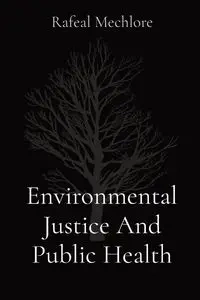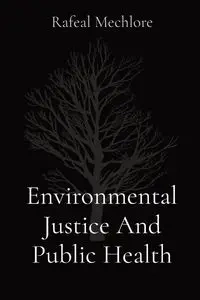Environmental Justice And Public Health - Mechlore Rafeal
"Environmental Justice and Public Health" is a compelling and intertwined field that addresses the intersection of environmental concerns and their profound impact on human well-being. It recognizes that environmental issues are not evenly distributed across society and that marginalized communities often bear a disproportionate burden of environmental hazards. This dynamic field of study and advocacy seeks to rectify these disparities, ensuring that all individuals, regardless of their socio-economic background or demographic, have equal access to a clean and healthy environment.
At its core, environmental justice and public health are intimately connected, as the environment in which people live, work, and play has a profound influence on their health outcomes. Here's a closer look at the key aspects of this critical intersection:
Environmental Hazards: Many communities, particularly those marginalized or disadvantaged, face a higher prevalence of environmental hazards such as air and water pollution, toxic waste sites, and industrial facilities. These hazards can lead to a range of health issues, including respiratory diseases, cancer, and developmental problems, affecting the overall well-being of individuals in these areas.
Health Disparities: Environmental injustice often leads to health disparities, where certain populations experience higher rates of illness and shorter life expectancies due to their exposure to environmental hazards. This exacerbates existing inequalities in healthcare access and outcomes.
Access to Resources: Environmental justice aims to ensure that all communities have equitable access to clean air, clean water, green spaces, and other environmental resources that promote good health. This includes addressing issues like food deserts, where disadvantaged neighborhoods lack access to fresh and nutritious food.
Community Empowerment: Environmental justice advocates work to empower communities to participate in decision-making processes regarding their environment. This includes providing them with the tools and knowledge needed to advocate for policies and practices that protect their health and environment.
Policy and Advocacy: The field of environmental justice and public health relies on policy initiatives and advocacy efforts to bring about change. These efforts often include pushing for stricter environmental regulations, community-based research, and legal actions against polluters.
Environmental Racism: Environmental justice also sheds light on the phenomenon of environmental racism, where minority and low-income communities face a disproportionate burden of pollution and environmental hazards. Addressing this issue is central to achieving equitable public health outcomes.
Global Impact: While many environmental justice discussions focus on local or national issues, it's important to recognize that environmental problems often have global implications. Climate change, for example, affects communities worldwide and requires collective efforts to mitigate its impact on public health.
Health Equity: Ultimately, the goal of environmental justice and public health is to promote health equity. This means that everyone, regardless of their background, should have the same opportunities to lead a healthy life, free from the adverse effects of environmental hazards.
Environmental justice and public health represent a powerful partnership between environmental stewardship and social justice. It recognizes that the health and well-being of individuals and communities are deeply intertwined with the health of the planet. By addressing environmental inequalities and advocating for policies that prioritize public health, this field contributes to a more equitable and sustainable future for all.
EAN: 9788196609467




"Environmental Justice and Public Health" is a compelling and intertwined field that addresses the intersection of environmental concerns and their profound impact on human well-being. It recognizes that environmental issues are not evenly distributed across society and that marginalized communities often bear a disproportionate burden of environmental hazards. This dynamic field of study and advocacy seeks to rectify these disparities, ensuring that all individuals, regardless of their socio-economic background or demographic, have equal access to a clean and healthy environment.
At its core, environmental justice and public health are intimately connected, as the environment in which people live, work, and play has a profound influence on their health outcomes. Here's a closer look at the key aspects of this critical intersection:
Environmental Hazards: Many communities, particularly those marginalized or disadvantaged, face a higher prevalence of environmental hazards such as air and water pollution, toxic waste sites, and industrial facilities. These hazards can lead to a range of health issues, including respiratory diseases, cancer, and developmental problems, affecting the overall well-being of individuals in these areas.
Health Disparities: Environmental injustice often leads to health disparities, where certain populations experience higher rates of illness and shorter life expectancies due to their exposure to environmental hazards. This exacerbates existing inequalities in healthcare access and outcomes.
Access to Resources: Environmental justice aims to ensure that all communities have equitable access to clean air, clean water, green spaces, and other environmental resources that promote good health. This includes addressing issues like food deserts, where disadvantaged neighborhoods lack access to fresh and nutritious food.
Community Empowerment: Environmental justice advocates work to empower communities to participate in decision-making processes regarding their environment. This includes providing them with the tools and knowledge needed to advocate for policies and practices that protect their health and environment.
Policy and Advocacy: The field of environmental justice and public health relies on policy initiatives and advocacy efforts to bring about change. These efforts often include pushing for stricter environmental regulations, community-based research, and legal actions against polluters.
Environmental Racism: Environmental justice also sheds light on the phenomenon of environmental racism, where minority and low-income communities face a disproportionate burden of pollution and environmental hazards. Addressing this issue is central to achieving equitable public health outcomes.
Global Impact: While many environmental justice discussions focus on local or national issues, it's important to recognize that environmental problems often have global implications. Climate change, for example, affects communities worldwide and requires collective efforts to mitigate its impact on public health.
Health Equity: Ultimately, the goal of environmental justice and public health is to promote health equity. This means that everyone, regardless of their background, should have the same opportunities to lead a healthy life, free from the adverse effects of environmental hazards.
Environmental justice and public health represent a powerful partnership between environmental stewardship and social justice. It recognizes that the health and well-being of individuals and communities are deeply intertwined with the health of the planet. By addressing environmental inequalities and advocating for policies that prioritize public health, this field contributes to a more equitable and sustainable future for all.
EAN: 9788196609467

